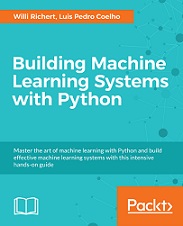
|
FreeComputerBooks.com
Links to Free Computer, Mathematics, Technical Books all over the World
|
|
- Title Building Machine Learning Systems with Python
- Author(s) Willi Richert, Luis Pedro Coelho
- Publisher: Packt Publishing (July 26, 2013)
- Hardcover/Paperback 290 pages
- eBook PDF
- Language: English
- ISBN-10: 1782161406
- ISBN-13: 978-1782161400
- Share This:

|
Expand your knowledge of Python data with the power of machine learning with this free and full-featured guide. Find out how to use cutting-edge Python machine learning algorithms to reveal the hidden insight in your data. You'll learn how to build machine learning for text, images, and sounds with free open-source tools and libraries.
As the Big Data explosion continues at an almost incomprehensible rate, being able to understand and process it becomes even more challenging. With Building Machine Learning Systems with Python, you'll learn everything you need to tackle the modern data deluge - by harnessing the unique capabilities of Python and its extensive range of numerical and scientific libraries, you will be able to create complex algorithms that can 'learn' from data, allowing you to uncover patterns, make predictions, and gain a more in-depth understanding of your data.
Featuring a wealth of real-world examples, this book provides gives you with an accessible route into Python machine learning. Learn the Iris dataset, find out how to build complex classifiers, and get to grips with clustering through practical examples that deliver complex ideas with clarity. Dig deeper into machine learning, and discover guidance on classification and regression, with practical machine learning projects outlining effective strategies for sentiment analysis and basket analysis. The book also takes you through the latest in computer vision, demonstrating how image processing can be used for pattern recognition, as well as showing you how to get a clearer picture of your data and trends by using dimensionality reduction.
About the Authors- Willi Richert has a PhD in Machine Learning/Robotics and currently works for Microsoft in the Bing Core Relevance Team. He performs statistical machine translation.
- Luis Pedro Coelho is a Computational Biologist: someone who uses computers as a tool to understand biological systems. Within this large field, Luis works in Bioimage Informatics, which is the application of machine learning techniques to the analysis of images of biological specimens.
- Machine Learning
- Python Programming
- Neural Networks and Deep Learning
- Artificial Intelligence
- Data Analysis and Data Mining

- Building Machine Learning Systems with Python (Willi Richert, et al)
- The Mirror Site (1) - PDF
- The Mirror Site (1) - 2nd Edition - PDF
-
 Foundations of Machine Learning (Mehryar Mohri, et al)
Foundations of Machine Learning (Mehryar Mohri, et al)
This book is a general introduction to machine learning. It covers fundamental modern topics in machine learning while providing the theoretical basis and conceptual tools needed for the discussion and justification of algorithms.
-
 Python Machine Learning Projects (Brian Boucheron, et al)
Python Machine Learning Projects (Brian Boucheron, et al)
This book tries to equip the developers of today and tomorrow with tools they can use to better understand, evaluate, and shape machine learning. If you know some Python and you want to use machine learning and deep learning, pick up this book.
-
 Deep Learning with PyTorch (Eli Stevens, et al.)
Deep Learning with PyTorch (Eli Stevens, et al.)
This book teaches you to create deep learning and neural network systems with PyTorch. It gets you to work right away building a tumor image classifier from scratch. You'll learn best practices for the entire deep learning pipeline, tackling advanced projects.
-
 Deep Learning with Python, 2nd Edition (Francois Chollet)
Deep Learning with Python, 2nd Edition (Francois Chollet)
This book introduces the field of deep learning using Python and the powerful Keras library. It offers insights for both novice and experienced machine learning practitioners, and builds your understanding through intuitive explanations and practical examples.
-
 O'Reilly® Python Data Science Handbook: Essential Tools
O'Reilly® Python Data Science Handbook: Essential Tools
Several resources exist for individual pieces of this data science stack, but only with the Python Data Science Handbook do you get them all - IPython, NumPy, Pandas, Matplotlib, Scikit-Learn, and other related tools.
-
 Dive into Deep Learning (Aston Zhang, et al.)
Dive into Deep Learning (Aston Zhang, et al.)
This is an open source, interactive book provided in a unique form factor that integrates text, mathematics and code, now supports the TensorFlow, PyTorch, and Apache MXNet programming frameworks, drafted entirely through Jupyter notebooks.
-
 Deep Learning for Coders with Fastai and PyTorch
Deep Learning for Coders with Fastai and PyTorch
This book show you how to train a model on a wide range of tasks using fastai and PyTorch. You'll also dive progressively further into deep learning theory to gain a complete understanding of the algorithms behind the scenes.





